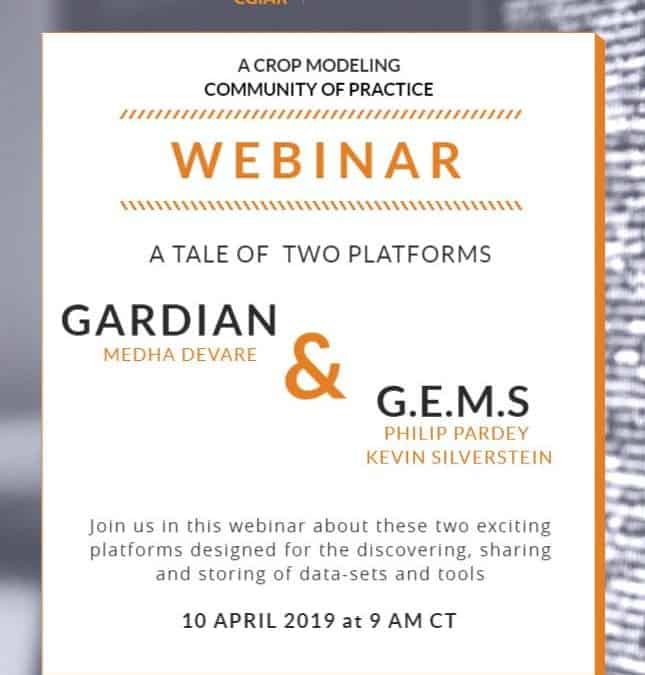Webinar – Tale of Two Platforms: GEMS & GARDIAN
CGIAR Webinar by the Platform for Big Data in Agriculture’s Community of Practice on Crop Modeling – A Tale of Two Platforms.
This webinar organized by the Crop Modeling Community of Practice consists of two presentations and demonstrations of the platforms G.E.M.S. and GARDIAN. Our speakers, Medha Devare, Philip Pardey, and Kevin Silverstein, will walk you through these exciting platforms.
Platform abstracts
GARDIAN
CGIAR’s 15 Agricultural Research for Development Centers aspire to produce data assets that are Findable, Accessible, Interoperable, and Reusable (FAIR) through the use of a consistent metadata schema, semantic standards for annotation, and data collection tools based on semantics, such as agronomy field books (Agronomy Field Information Management System, AgroFIMS) and breeding trial management tools (Breeding Management System, BMS; Breeding for Results, B4R). The CGIAR Platform for Big Data in Agriculture has launched the Global Agricultural Research Data Innovation and Acceleration Network (GARDIAN) which provides easy access to thousands of these data assets across all CGIAR Centers to enable new analyses and enhance innovation. It will soon facilitate data discovery from other relevant repositories, and also allow users to upload data to adhere to FAIR standards to the extent possible. GARDIAN also enables data visualization and mapping, with pipelines for data analysis and modeling to be made available in 2019.
G.E.M.S.
G.E.M.S is not another database. The College of Food Agriculture and Natural Resource Sciences (CFANS) and the Minnesota Supercomputing Institute (MSI) at the University of Minnesota have merged domain expertise in the food and agricultural sciences with HPC and bioinformatics expertise to drive the development of a next-generation agroinformatics data discovery and analysis platform called G.E.M.S. G.E.M.S brings together these individually powerful components to unlock novel insights from Genetic, Environmental, Management, and Socioeconomic data that will inform and enable innovative agro-economic decisions at different temporal and spatial scales. But innovation in agriculture requires reaching well beyond academia. G.E.M.S’s data parsing and data sharing capabilities are uniquely designed to enable new, agile, and mutually advantageous public-private collaborations in the pre-commercialization space. G.E.M.S also enables users to turn data into actionable information along the entire innovation value chain, from technology development, to deployment and stewardship.
Speakers
 Medha Devare
Medha Devare
Senior Research Fellow, International Food Policy Research Institute (IFPRI)
Medha Devare is Senior Research Fellow with the International Food Policy Research Institute (IFPRI). She led the CGIAR System‘s Open Access/Open Data Initiative, and currently leads efforts to organize data and enable semantic interoperability across CGIAR’s 15 agriculture for development-focused Centers through its Big Data Platform. Medha is an agronomist with significant experience in microbial ecology and bioinformatics, and led the CSISA-Nepal project addressing sustainable intensification of farming systems in western Nepal before moving to the CGIAR System Office. Medha also has expertise in data management and semantic web tools, and was instrumental in the development of VIVO, a semantic web application for representing academic scholarship at Cornell University.
Philip Pardey
Applied Economist, GEMS Board Chair
Phil is Director of Global Research Strategy for the University of Minnesota’s CFANS (College of Food, Agricultural and Natural Resource Sciences) and the Minnesota Agricultural Experiment Station (MAES), and Director of InSTePP (International Science and Technology Practice and Policy center). He has spent his career developing and analyzing data to improve innovation-driven outcomes in food and agriculture worldwide. Phil has authored more than 360 books, articles, and papers.
Expertise: bio-economics of technical change in agriculture, agricultural productivity, economic impacts of research & development
 Kevin Silverstein
Kevin Silverstein
Bioinformaticist, GEMS Operations Manager
Kevin is Scientific Lead for the Research Informatics Solutions (RIS) group at the Minnesota Supercomputing Institute (MSI). He has spent decades performing large-scale bioinformatics analyses involving cutting-edge high-throughput data from bacteria, fungi, plants, mammals and complex communities. He has performed detailed investigations of plant-microbe systems in continued research since 2001. Additionally, in 2010-2012, he led an effort to identify mutations in clinical patients with Fairview Hospital which has been expanded in partnership with MSI and continues to be used today. The knowledge gained from handling protected patient data has been brought over to this platform to protect farmer and corporate data. Kevin has authored 70 research articles.
Expertise: bioinformatics, systems biology, comparative genomics, databases, plant-microbe interactions
April 10, 2019


 Medha Devare
Medha Devare
 Kevin Silverstein
Kevin Silverstein


